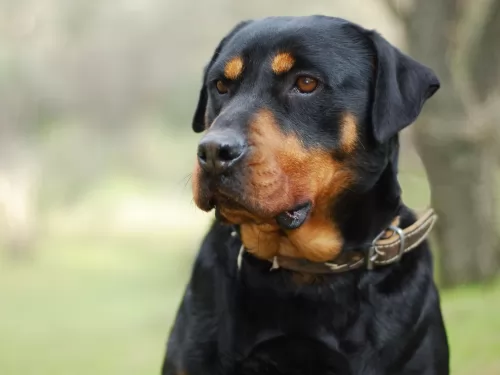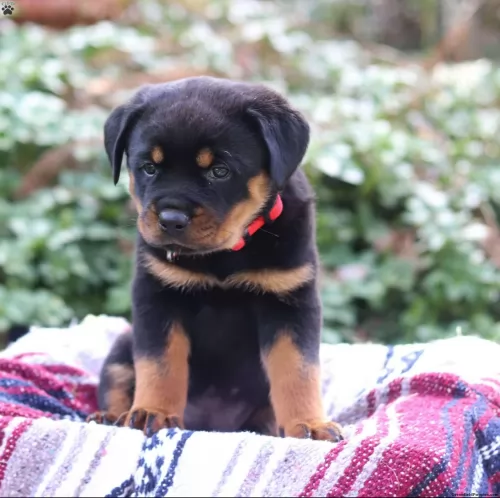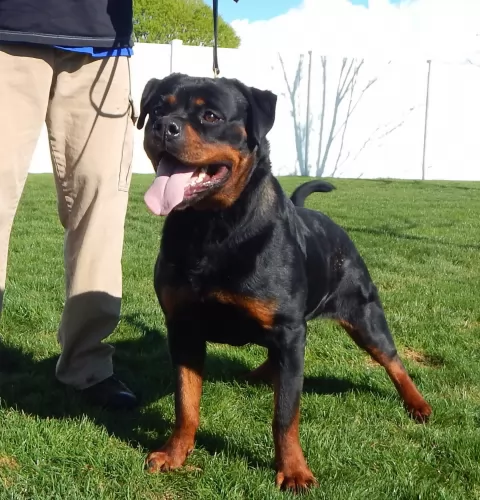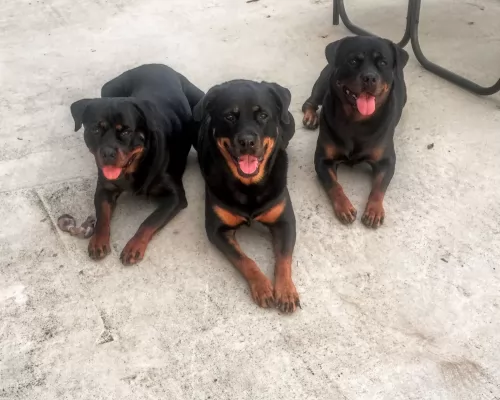 Petzlover
PetzloverRottweiler is originated from Germany but Kuri is originated from French Polynesia. Rottweiler may grow 23 cm / 10 inches higher than Kuri. Rottweiler may weigh 45 kg / 100 pounds more than Kuri. Rottweiler may live 3 years less than Kuri. Rottweiler may have more litter size than Kuri. Both Rottweiler and Kuri requires Low Maintenance.
 It is beleived to be the Rottweiler has been developed from the Roman cattle dogs. The Roman empire made a camp in a place at Germany in 74 AD. The area was called as 'das Rote Wil' and later as 'Rottweil'. In the middle ages Rottweiler was used in bear hunting and as a cattle dog. In 1899 the International club for Leonbergers and Rottweiler dogs was formed in Germany. In 19th century due to set in of railways the cattle was moved by railways and the need for the breed declined. When the world war was set in there came a heavy demand for police dogs. Rottweilers played a major role in first and second world war.
It is beleived to be the Rottweiler has been developed from the Roman cattle dogs. The Roman empire made a camp in a place at Germany in 74 AD. The area was called as 'das Rote Wil' and later as 'Rottweil'. In the middle ages Rottweiler was used in bear hunting and as a cattle dog. In 1899 the International club for Leonbergers and Rottweiler dogs was formed in Germany. In 19th century due to set in of railways the cattle was moved by railways and the need for the breed declined. When the world war was set in there came a heavy demand for police dogs. Rottweilers played a major role in first and second world war.
In 1921 many German Rottweiler clubs joined together to form ADRK, which is Allgemeiner Deutscher Rottweiler Klub. This is said to be the home club of Rottweiler. American kennel club recognised them in 1931. They become 9th most popular breed in America in 2013.
Kurī, also known as Guri or Peroor New Zealand Native Dog, is the Maori name for this dog which was introduced to New Zealand by the Maoris when they migrated from East Polynesia around 1280 AD.
They were in fact Polynesian dogs which died out in New Zealand. The Māoris would use the dog as a food source and the skins would be used to make some form of clothing. The bones were used to make items such as necklaces and fish hooks.
Not surprising then that the dog became extinct in New Zealand, with the last known Kuri specimens being found in the Museum of New Zealand Te Papa Tongarewa.
 Rottweilers are good natured, obedient and are very much eager to work. They are calm, confident and an excellent watchdog. They will not make friends immediately. Rottweilers can be said as an all purpose dog since they are suitable as companion and watch dog as well. He is good in herding and guarding as genital feature. Rottweiler must be trained from its younger stage and should not be hit while training. They have high energy level and thus they are interested in doing work if properly trained. There are more possibilities of biting the strangers because of watchdog tendency.
Rottweilers are good natured, obedient and are very much eager to work. They are calm, confident and an excellent watchdog. They will not make friends immediately. Rottweilers can be said as an all purpose dog since they are suitable as companion and watch dog as well. He is good in herding and guarding as genital feature. Rottweiler must be trained from its younger stage and should not be hit while training. They have high energy level and thus they are interested in doing work if properly trained. There are more possibilities of biting the strangers because of watchdog tendency.
They are very good in herding sheeps as they have a natural gathering style. They are clever and adjusts the barking sound according to the situation. While herding they used to prove the leadership by selecting the dominant one in the flock and challenging it. If they were made to watch a same flock of cattle regularly, then they will develop a bond with them and will be affectionate with them as long as the cattle obeys its commands.
The Kuri is extinct now but it was a small to medium sized dog with a thick set neck. He stood between 25 and 46cm and weighed about 13 to 15 kilograms.
He had thick medium-length rough textured hair, small head, erect ears, short legs and a bushy tail. The color of their weatherproof coats varied and some were black, some white or cream and some were a mix of colors and patterns.
An interesting feature about them is that they didn’t bark but instead they howled. They were good at hunting birds.
The Kuri wasn’t considered the brightest breed, but he would have benefited from some training and socialization as this just makes a dog a better pet in every sense – more obedient and better behaved in all situations.
Some Kuris were friendly and able to bond with their human owners, while others were independent and somewhat aloof. Their size would have allowed them to be kept in the city or the country as they weren’t particularly energetic dogs, not requiring much ground to run around in.
 They are friendly with children and enjoy the company with them. But it is not advised to leave them with children without adult supervision.
They are friendly with children and enjoy the company with them. But it is not advised to leave them with children without adult supervision.
Rottweilers do not make friends immediately but take time to know about new people. He is an excellent watchdog. Males are quiet in nature but are watchful and females are more affectionate and obey some more. A good training is required for them to obey your orders.
They are not good for apartment life and thus a fenced back yard will be better for them to play and spend the energy. They require companion and will be happy to walk around with you. Hot weather will be some what better for them when compared with cold.
Rottweilers are easy to train because of their high intelligence. The training should be started in their young stage to have best results. They should not be dominated but treated kindly with understanding. They should be comfortable with the surroundings and people. Giving him a reward for training will make him interested in doing it. If he does a mistake then he should not be hit, so that he may get fear and loss his interest in doing it. Punishments will never work for them but rewarding will make him encouraged. Simple commands such as sit and stand shall be taught to them.
It appears as though some Kuris were kept as pets and that they were able to develop loving relationships with their owners.
We don’t know too much about the extinct Kuri, but scientists are now studying and analyzing the hairs of the dog to find out more about it, and specifically why the Maori dog disappeared some time in the 19th century without a trace.
They will also be analyzing Kuri bones salvaged by archaeologists and which were found on rubbish heaps. These bones can be tested to see whether the diet of the Kuri changed much between the days of Maori settlements and the arrival of the European settlers.
 The health issues affecting the eyes of them are Cataract and Progressive Retinal Atropy. Health problems common in their joints are Hip Dysplasia, Elbow Dysplasia and Panosteitis. They also have chances to get circulatory system problems like Aortic Stenosis and Von Willebrand's Disease. Other common health problems in Rottweiler are Bloat and Cancer.
The health issues affecting the eyes of them are Cataract and Progressive Retinal Atropy. Health problems common in their joints are Hip Dysplasia, Elbow Dysplasia and Panosteitis. They also have chances to get circulatory system problems like Aortic Stenosis and Von Willebrand's Disease. Other common health problems in Rottweiler are Bloat and Cancer.
Mostly people think that Rottweilers don't shed but they are short haired dog and sheds more. They are having double coat that is undercoat and topcoat. The undercoat is softer and protects them in winter and topcoat is rougher and visible. It is said that they will shed in spring and winter seasons. Shedding can be reduced by brushing them.
Some Kuri dogs scavenged while others were pets and ate well. The lifestyle they led would have determined their health. In those days they would have suffered with dental disease, common in adult dogs. Left untreated, dental disease can lead to dental tartar buildup with gum inflammation and tooth loss.
Dental disease can also lead to other organ diseases. These days brushing your dog’s teeth with canine toothpaste and toothbrush can help to ward off dental disease.
Those Kuris that weren’t pets, tried to survive scavenging, and their homeless situation could well have led to ear infections – caused from a wax- and dirt buildup within the ear. He would have been frantic trying to scratch his ears. In modern times, if your dog showed signs of an ear infection, you would need to get him to the vet.
 Rottweiler puppies should be given a diet which has protein, carbohydrates and fats. They need different diets in their growing stages. They can be given chicken with bones and vegetables for 4 days in a week. Beef with vegetables can also be given. When feeding them red meat a raw meaty bone can also be included. Fish oil can be given such that starting with 1000 mg and making it to 3000 mg in a time of two weeks.
Rottweiler puppies should be given a diet which has protein, carbohydrates and fats. They need different diets in their growing stages. They can be given chicken with bones and vegetables for 4 days in a week. Beef with vegetables can also be given. When feeding them red meat a raw meaty bone can also be included. Fish oil can be given such that starting with 1000 mg and making it to 3000 mg in a time of two weeks.
High calories of protein should be provided to them to meet their energy requirements. While buying commercial food it should be checked for the main ingredient to be meat. Protein levels should be more from animals than vegetables. High quality dairy products should be included. Food should not have low quality flavours and preservatives. Healthy fat is necessary for their skin and coat. If these fats are not provided it will cause dandruff and itchy skin.
Brushing them weekly once is recommended for their coat and skin. Buying the puppy from reputable breeder will be better. Vaccinations and preventive medicines should be given on right time. Spaying and Neutering should be done to avoid unwanted pregnancy. High quality diet should be maintained. Making them to bath once in a week is advisable. Nails should be trimmed once in every two weeks.
Rottweilers like to chase something and Laser pointer will be a good game for them. It will make them busy and also entertain us. But it should be on a limit and they should not get bored. A treat or toy can be hided and they can be made to find it. A bottle should be filled with water and frozen. The frozen bottle can be given to them for playing. In summer time it will make them very happy to play with it. A ball or toy can be thrown and they can be made to fetch it. Walking them is also a good exercise.
The Kuri will have required regular grooming which means a brushing down twice a week. Brushing would have been useful to prevent loose hairs from shedding with the dog. He would have had to have his ears and eyes checked too to avoid infections. Brushing him would have given his owner the chance to check him over for fleas and ticks too.
As the Kuri wasn’t an overly energetic dog, a walk a day would have kept him content and fit.
The Kuri was a dog that essentially formed part of someone else’s diet. Those that managed to escape being a meal for someone no doubt had to scavenge for food. Because they were used to help people catch birds, they themselves were used to catching birds for themselves.
As a small to medium sized dog, if you were to keep such a dog as a pet you would have given him a cup or two of dried kibble a day and tried to vary his diet by including some home-cooked food and raw meat.